How It Works
Our Program
Three generations, stronger together
Bridge Meadows uses the power of community to help children heal from the trauma of foster care. Our program includes high-quality affordable housing, therapeutic programs, and intergenerational community support.
Elders live in the community, serving as mentors, friends, and caregivers to the children and each other, forming a safety net of care and interdependence.
Our Theory of Change shows how this safety net improves quality of life for all three generations: children, parents, and elders.
Our Recipe for Community: Housing, Connection, and Clinical Support
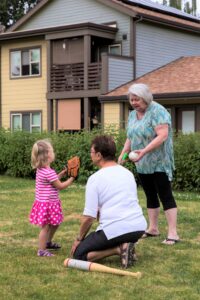 Housing:
Housing:
We build affordable housing with independent townhomes and apartments to support permanency. Intentionally designed spaces encourage connection and relationship-building, while providing safety and security. Learn about our community buildings here.
Connection:
The community connects around the shared social purpose of permanency for youth formerly in foster care. Connection means shared meals, conversations, and games after dinner. A summer evening stroll after tending the community garden, and checking in on a neighbor. See our community in action in this video!
Clinical Support:
Clinical staff weave the community together with trauma-informed support services and community-building expertise to facilitate connection and mutual support. Our approach is strengths-based, meaning that we believe every individual is inherently capable and resourceful. Strengths-based approaches can improve social networks and enhance well-being. Read more about strengths-based approaches here.
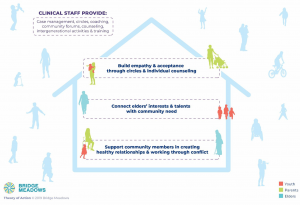
Safety, Purpose, and Belonging Cultivate Resilience and Healing
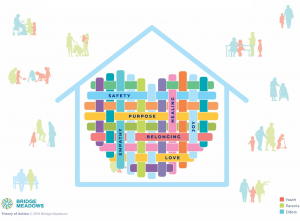
Program Partners
Our partners provide an array of resources and classes to the community. For example, Hollywood Senior Center contracts with Multnomah County Aging Services to conduct Tai Chi (a fall prevention program) for elders in North Portland and the broader community. Tualatin Hills Park & Recreation District offers summer activities for youth, and Bridge Meadows North Portland has partnered with Cathedral Park Performing Arts Collective (CPPAC) to offer music classes.
We also partner with Kinship House to provide therapeutic services for children and families in the child welfare system. Kinship House has a co-located office at our Beaverton site so that both organization’s can collaborate, ensuring that our onsite interventions are trauma-informed and possess the cultural competencies necessary to successfully serve our youth and adoptive parents.
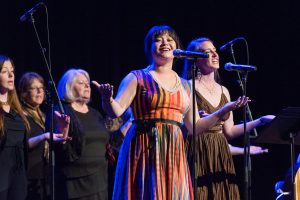
Our Impact
Creating thriving communities
Our intergenerational model improves quality of life for all.
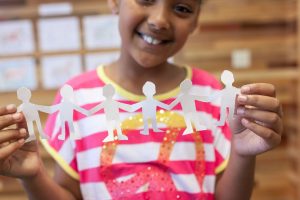
Youth
Bridge Meadows measures resiliency to understand youth’s ability to navigate resources and “bounce back” from challenging situations. Learn more about resiliency and its use as a predictor of health and wellness.
- 100% of youth have enough food to eat every day.
- 100% of youth scored as highly resilient.
- 77% of youth saw a dentist for preventative care and 88% of youth saw a doctor for a non-emergency, preventative well-child checkup, compared to 58% of their foster care peers.
- 88% of youth reported there is at least one adult at school they feel supported by.
Parents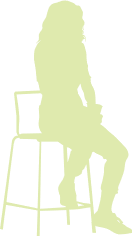
- 77% of parents felt they had the skills and ability to keep going in times of crisis, i.e. coping. (“Inability to Cope” was cited in 13.2% of those cases involving child removal due to Parent/Family issues in Oregon in 2021.)
- 77% of parents reported having access to supports from friends, family and neighbors.
- 77% of parents reported having access to tangible goods and services to help families cope with stress, particularly in times of crisis or intensified need.
 Elders
Elders
- Elders report an average score of 92% on the flourishing scale (e.g. they perceive themselves as flourishing in life).
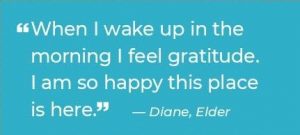 89% of elders felt reported having access to supports from friends, family and neighbors.
89% of elders felt reported having access to supports from friends, family and neighbors.- 87% of elders report they lead a purposeful and meaningful life, and that they actively contribute to the happiness and well-being of others.
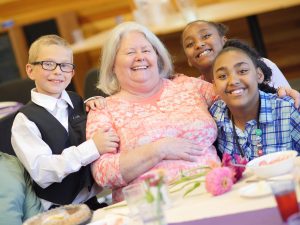
Housing
- 95% of residents maintain stable housing.
- 225 people currently live in a Bridge Meadows community.
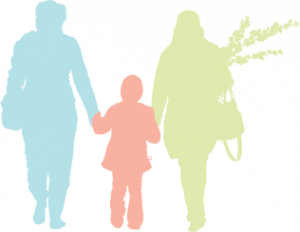 A Social Return on Investment
A Social Return on Investment
Each child who finds a forever family and lives at Bridge Meadows saves human services $439,000 annually in foster care payments.
The 53 youth currently living at Bridge Meadows saved a potential $15 million in lifetime costs to the system. Social costs are taxpayer-funded costs such as public assistance, incarceration, and other costs absorbed by the community.
Social isolation increases Medicare costs by an estimated $6.7 billion per year; Bridge Meadows’ program of reducing social isolation in elders works to lift some of this financial burden on the system. Check out this 2018 NPR Marketplace feature on Bridge Meadows.
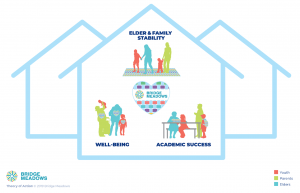
Stories
Real families. Real stories.
Reba’s Family
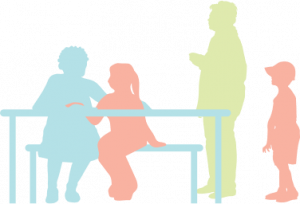
Years ago, Miss Reba got a phone call informing her that her two grandchildren, Reba (affectionately called Little Reba) and Lydia, had been removed from their parent’s home. It was a call that would change her life forever as she was asked if they could come live with her.
When Miss Reba’s grandchildren first came to her, she was living in a two-bedroom apartment in North Portland. It was not an ideal living situation for the new family.
Reba had been hoping for a solution to get her new family into a more healthy living situation—one she could afford and would provide the children with the living space they needed to really thrive. When Miss Reba’s ODHS worker told her about the opening at Bridge Meadows, she felt as if a prayer had been answered for her.
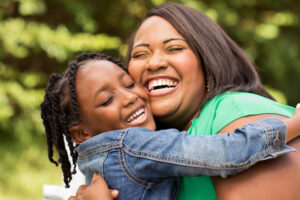
“Bridge Meadows provided a fresh start in a place and with a community that could meet our needs.”
Since arriving at Bridge Meadows, Miss Reba and the kids have grown immensely. Little Reba’s taken up photography, giving her a renewed sense of joy and curiosity. Miss Reba obtained her bachelor’s degree and was able to finish graduate school!
Best of all, “Little” Reba is more trusting, confident, and social, and Lydia has become a social butterfly and great public speaker and advocate for the youth in the community. All three feel connected to a loving and vibrant community, something Miss Reba hoped would happen for her family.
“It’s important in everyone’s life to be loved, to be supported, and to have friends and people that you can call family. Bridge Meadows is our big family and it’s awesome.”
Jackie’s Family
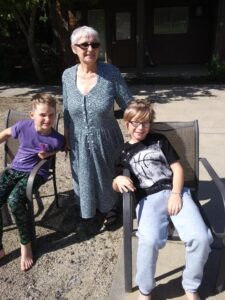 Interested in more stories? Check out this New York Times article about Jackie and her family, who recently purchased a home after being a part of the Bridge Meadows community for a decade.
Interested in more stories? Check out this New York Times article about Jackie and her family, who recently purchased a home after being a part of the Bridge Meadows community for a decade.
“Ms. Lynn was at her breaking point when a child welfare worker told her about Bridge Meadows, a new multigenerational housing community for older adults with low incomes, adoptive families or ‘grandfamilies’ — with a grandparent, adult family member or friend raising a child — like hers. Bridge Meadows, in North Portland, had nine townhouses available for eligible families and 27 apartments for single, older adults. Besides affordable rent, Bridge Meadows would offer social services, like mental health specialists.
Less than three months later, Ms. Lynn was unpacking there. ‘There was a world of weight taken off my shoulders,’ she said.”
Laura’s Family
Laura, a parent of three, says, “For me, Bridge Meadows is about thriving, not just surviving. We have these gorgeous homes with plenty space for my kids, and then they get to use all the services – the art, the therapy, the dance. They get to go up Maslow’s Hierarchy of Needs and be creative and explore their self-expression. I want my kids to have a lot enrichment and they get that at Bridge Meadows, but the staff brings that enrichment to us which makes it so much easier to access.”
Info Sessions
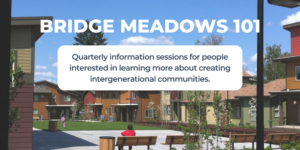
Want to create an intergenerational community in your neighborhood but not sure how to get started? Our Leadership Team hosts 60-minute info sessions quarterly to provide a high-level overview of the resources and partnerships necessary for developing such a community. For more information or to sign up for a session, email us at info@bridgemeadows.org.
